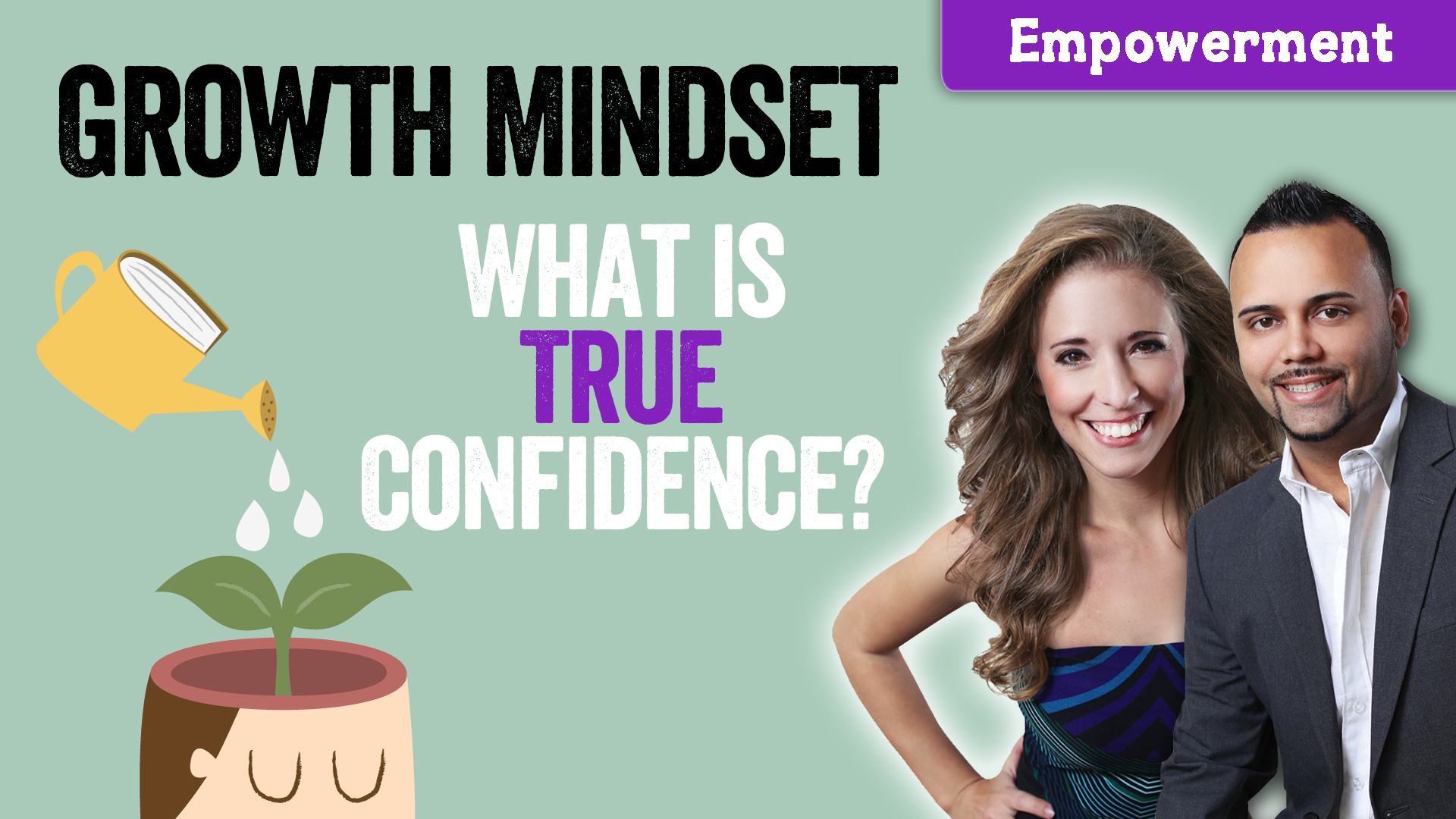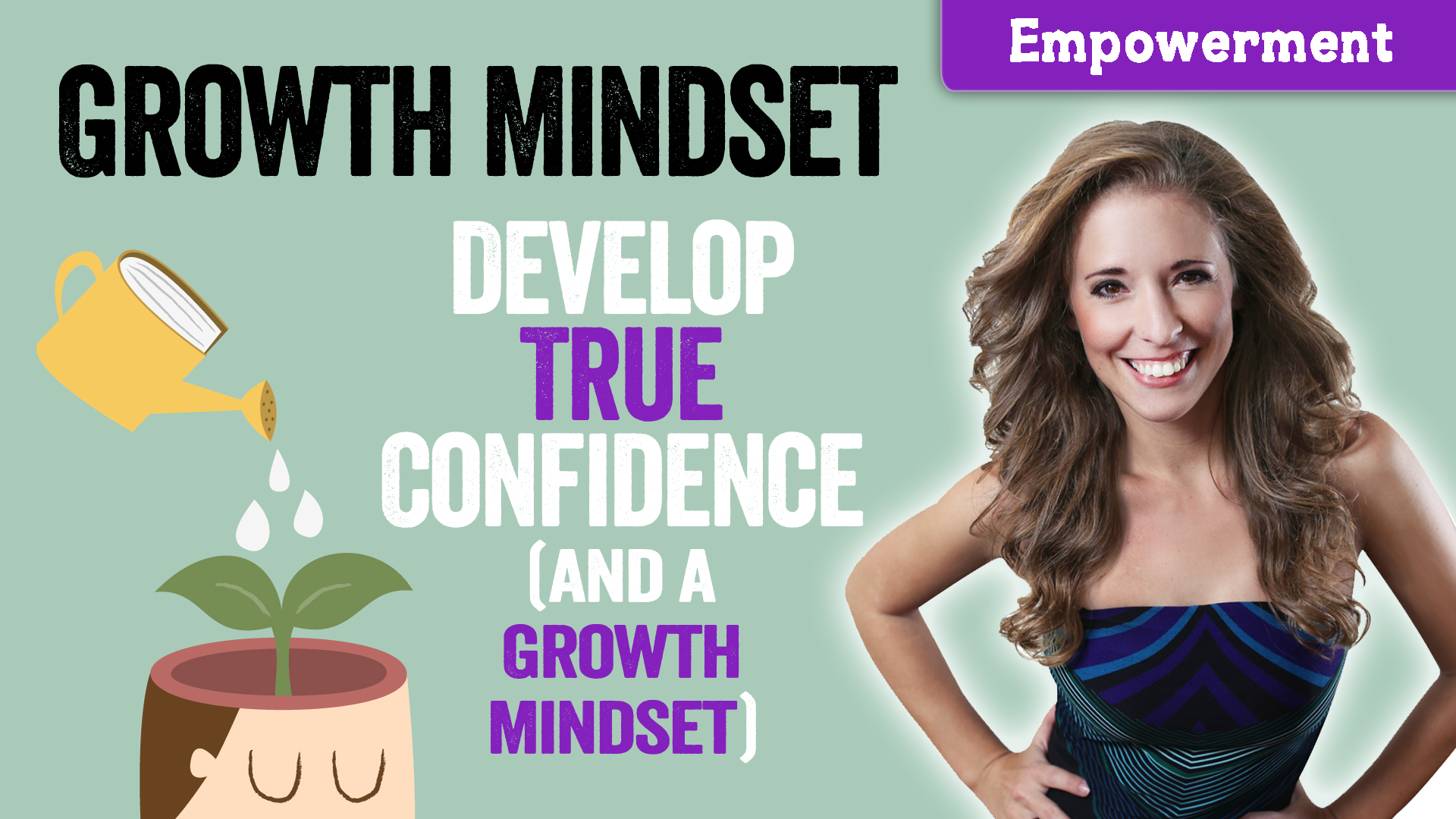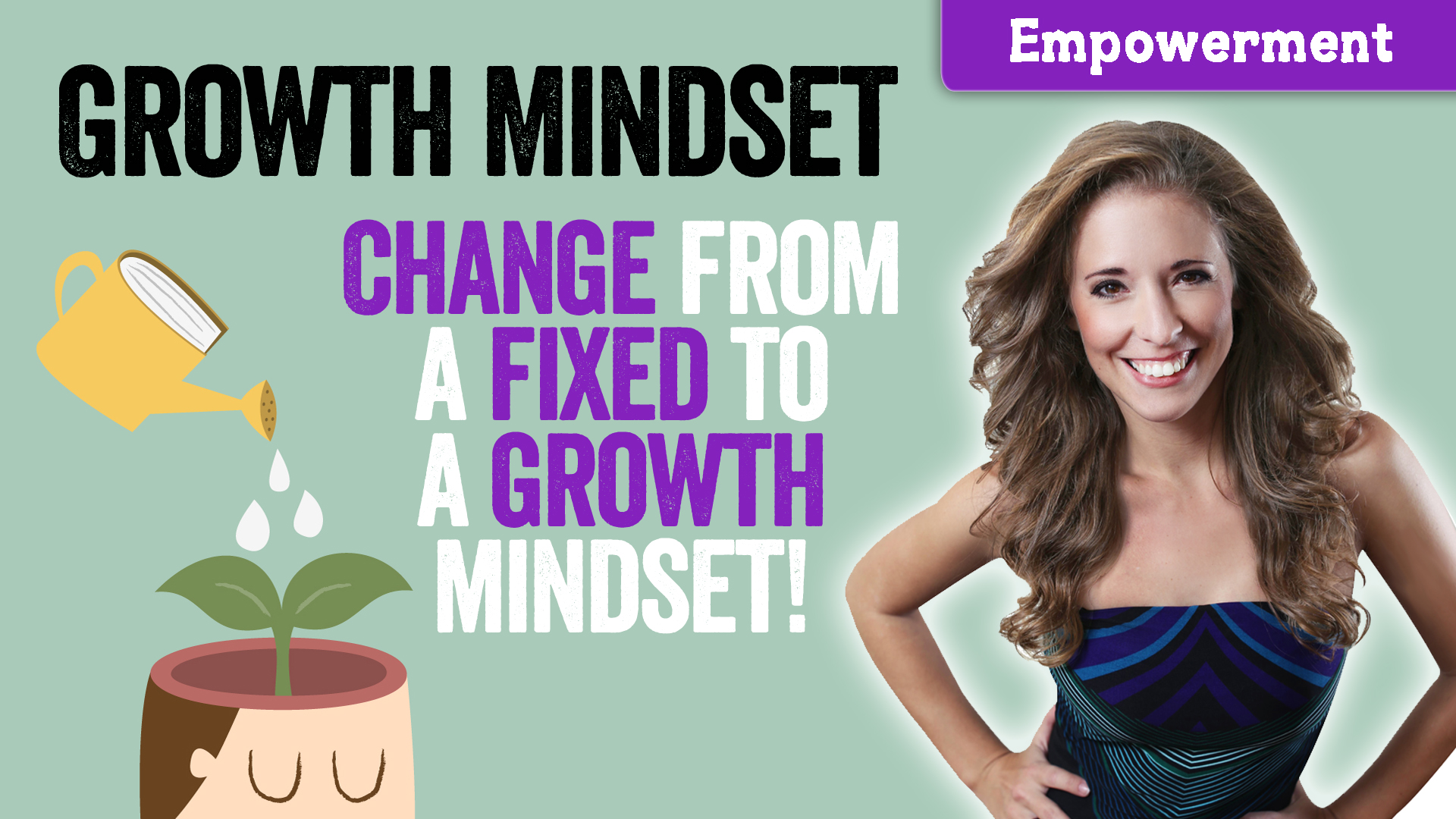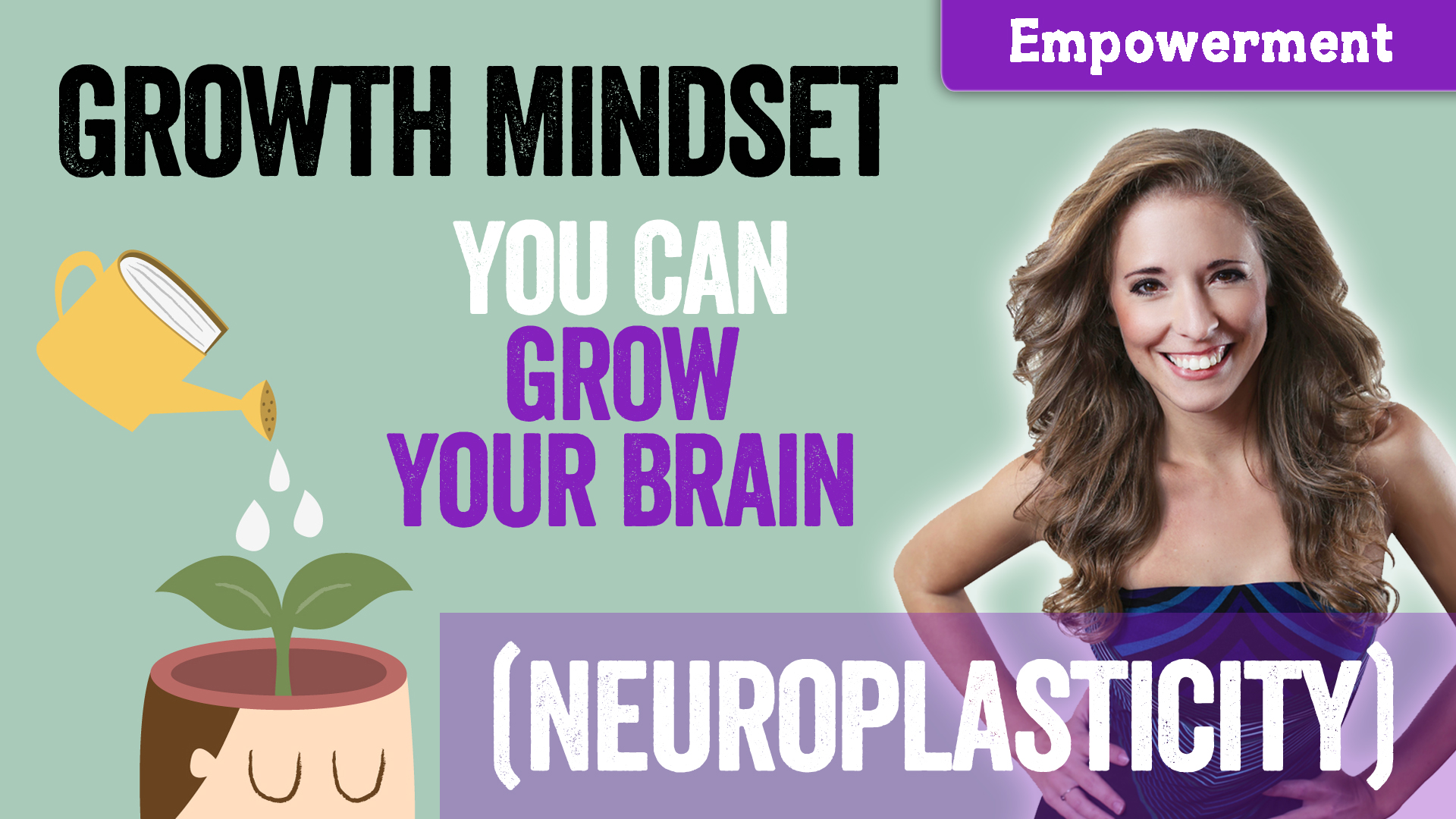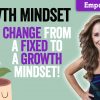Develop a Growth Mindset of TRUE Confidence
Developing confidence is developing an identity of someone who will take action and figure it out. In order to have this identify, you have to believe you have control over your life and that you’ll take action. There are two foundational psychological concepts here that need to be in place for this to happen.
The first is called locus of control, which refers to what you believe is and is not within your control. Some people feel like life is simply happening to them, like they’re a victim to whatever might happen. They have an external locus of control. Other people believe they are in control of their lives. Even when something happens to them that appears to come from the outside, they still see how they have power over the outcome. This is an internal locus of control. Everyone varies how much control they feel they have, depending on the circumstance.
SO, the question is, how do you develop an internal locus of control and feel empowered about your life?
This is where the second psychological principal comes in: a bias toward action. If you feel like your life is out of your control, you’re unlikely to take action because you don’t believe it will make a difference. You have a bias toward inaction. So, in order to overcome this, you can begin taking action and seeing what happens. The goal is to act when you normally wouldn’t, which will lead to changes in your circumstances you wouldn’t have had otherwise. Doing this over time shows yourself that you have more influence over your life than you thought. You develop a bias toward action, meaning you believe you’re the type of person who takes action to influence their own life. This, in turn, develops your internal locus of control and makes you feel empowered to direct your own life. It gives you confidence.
But, there is one underlying psychological principle that is even more important to understand. It’s the core belief that ultimately determines your ability to have an internal locus of control and a bias toward action. It’s the one key ingredient to developing confidence. It also happens to be the same belief that usually differentiates those who are successful from those who are not.
However, it’s not just a belief, it’s a mindset. It’s a way of looking at yourself and at life.
People who have this mindset are more resilient, they’re better at coping with failure, and they’re more likely to challenge themselves. Ultimately, they’re more confident. Those who do not have it are less resilient, are poor at coping with failure, and avoid challenge that could reveal their flaws.
So, it sounds pretty important, right? It is. But, before I tell you what it is, let me tell you a quick story.
When I was in high school and college, I didn’t take credit for my good grades. In fact, I almost felt guilty about them. I believed I did well because I was naturally smart. I did better than others because I was smarter. I didn’t like being praised or recognized because I felt bad making others feel inferior. It wasn’t their fault, they just weren’t as lucky as me. Then, when I went back to college full time to finally finish my degree, I had an epiphany. I realized that I acted differently that other people. I made different decisions. I considered that maybe I was more successful not simply because I was intelligent, but because I put in effort. Maybe it was because of those times I would stay home and work on my homework while my friends were out partying. Maybe it was how I paid attention in class and took great notes. Maybe it was because I cared about doing well and worked hard for my A’s. A couple years later I was running a teen life coaching center and I was telling my business partner about this epiphany. I was pointing out that my success as an entrepreneur was because I put the effort in to reflect and discover what I really wanted, I chose to go back to school, and was willing to start a business in my 20’s. Her reaction was to put me down and shove me back into that same old box… she said I was able to do all of these things because I was smarter, I was more privileged. It was easy for me. And, therefore, I shouldn’t take the credit.
So, who was right?
Consider the following example and how you would feel if it was you. Imagine that you had a terrible day. You spilled coffee on your shirt on the way to work, you got a parking ticket on your lunch break, and your boss reprimanded you for publishing a document with several major errors. How would you react?
- a) You’d feel bad about yourself for being clumsy, unintelligent and unlucky. You’d accept that this is just how your life goes.
- b) You’d be upset but you’d be thinking about how you should probably use a better travel mug, be more careful when you park, and double check your work.
Then, I want you to answer these questions:
- If I told you that your intelligence, like an IQ score, is something about you that you can’t change, would you a) agree or b) disagree?
- If I told you that talents are something you are born with would you a) agree or b) disagree?
So, did you answer mostly a’s or b’s?
Before I tell you about the mindset I’m talking about here, and what the a’s and b’s represent, I want you to know the number 1 most important thing you need to know about it.
If you don’t already have this mindset, the good news is that you can LEARN IT. In fact, sometimes simply knowing about it can dramatically alter people’s lives because it changes the way you look at yourself.
This core belief system I’m talking about is called the Growth Mindset. And the opposite way of viewing the world is called the Fixed Mindset.
If you answered all b’s and you agreed with my epiphany, you have a growth mindset. If you answered some a’s, that’s okay, because your answers to those questions will be very different when you learn more about the growth mindset!
So, let me explain what this means.
The research behind the growth mindset has been conducted by Carol Dweck, PhD who is a psychology professor at Stanford University. In a nutshell, the growth mindset is a belief that your basic qualities, including intelligence and talent, can be cultivated through effort. This means that while people may be innately different, with certain aptitudes and temperaments, all aspects of a person’s abilities and personality can be changed, regardless of where your setpoint is.
The fixed mindset, on the other hand, is a belief that these same characteristics are fixed at birth or become locked-in by a certain age. This means that some people are just inherently more talented or intelligent than others and that’s just the way it is.
If you feel like at least part of you believes that intelligence and talent are fixed, you are not alone. Most people, especially in the western world, believe this because our culture teaches us that it’s true. So, it’s not your fault. Emphasis is put on testing us to determine our intelligence, such as taking an IQ test or being graded. No one stops to think that a single test taken on a certain day at a certain age cannot possibly predict how well you would do on the test years later, after learning more, or when you’re in a better mood. But, we’re taught that these tests identify what we’ve got and that’s it. We’re stuck with it.
We also live in a culture that is obsessed with “natural talent”. Imagine 2 tennis players had an equal level of ability and were going to be competing in a match. You were told that one of them was a natural who barely had to try and the other had to work 10 hours a day to perform at that level. Who would you expect to win the match? The vast majority of people vote for the natural because we’ve been trained to value natural ability over cultivated ability.
There are two problems with this. One is that, in reality, the people who work hard to develop their abilities far out-win the naturals in the long run. The other problem is that if being a natural is so important, it actually discourages the effort it takes for those who have to work at it.
And, that’s exactly what happens.
People with a fixed mindset believe they’ll always have the same level of talent regardless of how much effort they put in. They’ve either got it or they don’t. Because of this the spend a lot of effort trying to prove their abilities and intelligence. They want to look smart. So, if they’re not immediately good at something, they stop doing it. This is because they’re in a constant quest to prove that they are talented or intelligent. To a fixed mindset person, effort is a bad thing. Having to work hard at something is a signal that you’re not a natural talent or that you’re not of high intelligent because if you were you wouldn’t’ have to try. As a result, they don’t challenge themselves, they don’t like trying new things, and so they never develop their potential. They’re trapped reaching only as far as their current abilities can take them. They’re trapped because failure is devastating. It means they are a failure. And because they don’t want to have to take on an identity as a failure, they’ll often blame others or the outside world. Fixed mindset people find joy in being the best or being judged as talented or smart.
Growth mindset people see the world very differently. They believe that the more effort they put into something, whether it’s practicing or learning, the better they will become. If they’re not good at something they see it as a sign that they have to work harder. They have little need to prove they are talented or intelligent and instead are on a never ending quest to continue to grow. How hard someone tries is how they measure the person’s value. They enjoy challenges and see them as an opportunity to learn something and expand their boundaries. They may not like failing, but they don’t ever believe they are a failure. They see failure as a learning experience. Growth mindset people find joy in progress and learning.
So, what is important to know here is that if you didn’t already know that you can change and improve your talents, skills, intelligence, characteristics, and behaviors, now you know! And it isn’t just the studies behind the psychology of the growth mindset that back this up, its brain and neuro science too! It’s not just your belief system that can change or your actual abilities, your brain changes right along with them.
So, all of those things that you didn’t think you could do simply because you haven’t done them, they’re all now possibilities again!
In the next article in this series, we’re going to talk about how to develop a growth mindset.
________________________________
Ready to dive deeper into developing TRUE CONFIDENCE and a GROWTH MINDSET? Get Started!
Want to help other people develop confidence and a growth mindset? Become a Confidence Life Coach!
Growth Mindset Series
4-Part Article & Video Series
Click below to view additional blogs in the series. SCROLL RIGHT >>>

